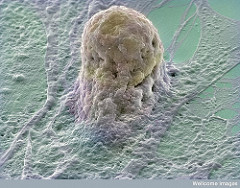Parkinson’s Disease is a motor system disorder. It typically occurs in those over fifty and is characterized primarily by involuntary movements, stiffness, slowed movement (called bradykinesia), and problems with coordination and balance. It is caused by a loss of neurons that produce the very important brain chemical dopamine, which is involved in regulation of movement. Currently, no cure exists for this disorder, only treatments to alleviate symptoms. However, these come with their own sets of problems, and scientists are now looking at animal models to study this debilitating disorder and find better treatments.
Image source: Cavallini James
In one recent study, scientists took human embryonic stem cells, turned them into dopamine neurons, and transplanted them into the brains of rats modeling Parkinson’s disease. This corrected the rats’ dopamine levels and long-distance connectivity in the brain, which returned their motor functions back to normal!
While the results of this study are promising, more steps need to be taken before these findings can be translated into human clinical trials for treating Parkinson’s Disease.
Feature Image Source: B0006219 Human embryonic stem cell by Wellcome Images










